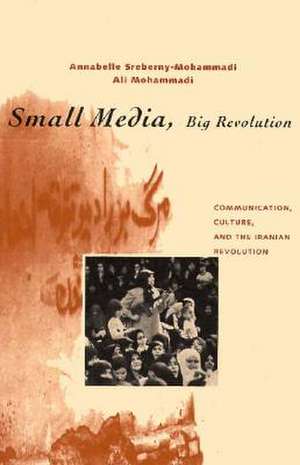Small Media, Big Revolution: Communication, Culture, and the Iranian Revolution
Autor Annabelle Sreberny-Mohammadi Contribuţii de Ali Mohammadien Limba Engleză Paperback – 15 aug 1994
To most Westerners, the Iranian revolution was a shocking spectacle, a distant mass upheaval suddenly breaking into the daily news. It was, in fact, a revolution of the television era, as these authors book clearly demonstrate. The first account of the role of culture and communication in the Iranian revolution, this is also the first book to consider revolution as communication in the modern world.
Coauthored by participants in the revolutionary upheaval, this study reflects an unusual breadth and depth of perspective. Drawing on ten years of research, the authors vividly show how the processes and products of modernization were used to undermine the very foundation of modernity in Iran. Their work reveals how deeply embedded cultural modes of communication coupled with crucial media technologies were able to mobilize a population within a repressive political context. Tracing the use of small media (audio cassettes and leaflets) to disseminate the revolution, the authors challenge much of the theory that has dominated international communication studies-and, in doing so, question the credibility of the established media. They also examine the dilemmas of cultural policy making based on Islamic principles in a media-saturated domestic and international environment.
Preț: 127.73 lei
Preț vechi: 170.32 lei
-25% Nou
Puncte Express: 192
Preț estimativ în valută:
24.44€ • 25.43$ • 20.18£
24.44€ • 25.43$ • 20.18£
Carte indisponibilă temporar
Doresc să fiu notificat când acest titlu va fi disponibil:
Se trimite...
Preluare comenzi: 021 569.72.76
Specificații
ISBN-13: 9780816622177
ISBN-10: 0816622175
Pagini: 256
Ilustrații: 18 photographs
Dimensiuni: 152 x 229 x 18 mm
Greutate: 0.34 kg
Ediția:First edition
Editura: University of Minnesota Press
Colecția Univ Of Minnesota Press
Locul publicării:United States
ISBN-10: 0816622175
Pagini: 256
Ilustrații: 18 photographs
Dimensiuni: 152 x 229 x 18 mm
Greutate: 0.34 kg
Ediția:First edition
Editura: University of Minnesota Press
Colecția Univ Of Minnesota Press
Locul publicării:United States
Notă biografică
Annabelle Sreberny-Mohammadi is professor and director of the Centre for Mass Communication Research, University of Leicester, England. Ali Mohammadi is a reader in international communication and cultural studies at the Nottingham Trent University, England. They are coeditors of Questioning the Media (1990).
